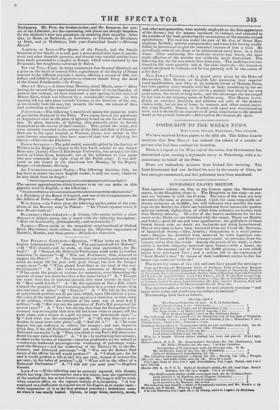NEW POLITICAL "What broke Up the Wel lington Administration ?
" Answer, " The anticipated call for Reform." —Q. Why 'should a call be made, at that time particularly, for Reform ?" A. "Because the Duke said Parliament could make no further reduction !in taxation."—Q. " Was not Parliament, then, disposed to support the Duke?" A. "No: because he was reducing patronage, and could no longer fill the poor with good things; but sent the hungry empty away."—Q. " What placed' Lord Grey at the head of the new Government ?" A. ‘‘• His well-known adherence to Reform."—Q. " What made the people so anxious for reduction, notwithstanding the amount of taxes was much less than a few vears before?" A. " Though the taxes were less in nominal amount, tiles,. were heavier in fact."— Q. " How could this be ? " A. "By the operation of Peel's Bill, which 'reduced the quantity of the circulating•medium in a greattr degree than the remission of taxes."—Q. " Explain." ' A. " The-fall in the value of agricultural produee was•25 per cent. Which, upon 180 Millions a year, the value of the annual produce, was equal to a reduction in that value of 45. millions, whilst the reduction of the taxes was at most a or 7 " But wassiot the operation' of Nes:Bill:postponed for several years ?" A. " Yes but during that time the fluctuation of the currency was so irregular that men did not know what to expect; till the panic came, and a return to a gold currency was determined upon."— Q. "And what was the consequence ? " A." All men then saw a reduction in taxes must take place."—Q. "And did it ?" A." In some degree, but not sufficient to relieve the country ; and men began to think that, if the old Parliament could not male greater reductions, a Reformed one might."—Q. "Then you think it was Peel's Bill that introduced the new state of things ?" A. " I do : by contracting the currency, it added to the burden of taxation—taxation produced a cry for reduction —reduction weakenedpatronage—the weakening of patronage weakened the Ministry—and the weakening of the .Ministry let in the Reformers, and destroyed. patronage."--Q. "Was not Sir Robert Peel aware of the effects his bill would produce ?" A. "I think not ; for he said it would produce a fall of only five per cent., instead of twenty-five per cent., in the value of produce."..—Q. "'What will be the effect of a Reformed Parliament ?" A. "I will tell you next year."—Bsigkton
Gazette. • Locx-JAW.—If the following case be correctly reported, this disease, which has long, like consumption. and a few others, been the opprobrium of the medical art, has at last found -a specific. -We hope it will be tried, when occasion offers, on the cognate malady of hydrophobia. "A boy .employed as a chaffcutter so injured one of his fingers as to render immsdiate amputation of it at the first phalanx necessary; locked-jaw came ma when it was nearly healed. Opium, in large doses, mercury, musk,
and other antispasmodics, were actively employed on the first appearance of the disease ; but the spasms increased in violence and extended to the muscles of the back, producing the contractions the muscles termed opisthotonos. The case was under the care of Mr. joy, of Oreat.Mas. singham, Norfolk ; and the antispasmodics and warm bath having totally failed, be determined to give themuriated tincture of iron a trial. He accordingly ordered ten drops to be administered every hour, in a little water. After continuing this medicine twenty-four hours, the spasmodic affection of the muscles was evidently much diminished. The following day the lad was nearly free from pain. The medicine was continued in the same quantity and at the same intervals,—the disease so rapidly decreased in violence, and he was yerfectly well in the course of
a few days?' •
NEW .FEmALE VOCALIST.—At a grand party . given by the Duke of Devonshire, Miss Masson, an English lady possessing very superior vocal qualifications, and who, as an intimate friend of Madame Pasta, has been passing many months with her in Italy, benefiting by her example and instructions, sang two airs in a manlier that showed her own great talent, the result of long study, and the advantages she has reaped by her visit to the reigning queen of Italian song. Miss Masson is evidently an, excellent musician, and mistress not only of the modern Italian Style but moless at home in . oratorio and other sacred music. She sings liandel, Mozart, or Rossini, with equal and discriminating taste, and is decidedly an acquisition of great importance to the musical world at the present moment.—Dilettantc in Harmonicon for April.


























 Previous page
Previous page